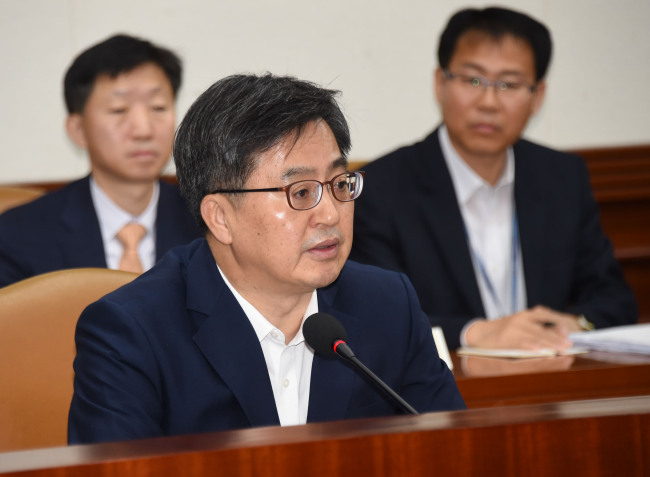Govt underlines innovation, dithers over deregulation
Govt pledges for 60,000 new jobs, fuel tax cut, but fails to come up with detailed deregulation plans for industries
By Bae HyunjungPublished : Oct. 24, 2018 - 16:18
The South Korean government on Wednesday announced a set of innovative growth actions plans, centering on ways to create new jobs and revitalize private investment.
Addressing the automobile, auto parts and shipbuilding industries -- all having undergone extensive restructuring earlier this year -- the government pledged to extend guarantees for corresponding companies and create some 60,000 new jobs for various age clusters within the year. It also revealed a financial program for small-sized businesses and a tax cut for automobile users.
The announcement, however, did not include tangible deregulation solutions for sharing economy businesses that have been in sharp conflict with conventional rivals, as in the recent case of carpool services and the taxi industry.
Addressing the automobile, auto parts and shipbuilding industries -- all having undergone extensive restructuring earlier this year -- the government pledged to extend guarantees for corresponding companies and create some 60,000 new jobs for various age clusters within the year. It also revealed a financial program for small-sized businesses and a tax cut for automobile users.
The announcement, however, did not include tangible deregulation solutions for sharing economy businesses that have been in sharp conflict with conventional rivals, as in the recent case of carpool services and the taxi industry.

“The latest policy measures seek to suggest rational solutions to the ongoing business-related disputes, revitalize the market and establish an entrepreneurial environment,” Deputy Prime Minister and Finance Minister Kim Dong-yeon said in a meeting of economy-related ministers, upon releasing the government’s final road map on innovative growth and job creation.
Facing the country’s struggling employment indexes, the government had decided in mid-September that the incumbent economic policies need to be revised in order to respond to declining investor spirit and consumer sentiment.
Wednesday’s ministerial meeting was also attended by several Cheong Wa Dae officials, including Jung Tae-ho, Yoon Jong-won, and Kim Su-hyun -- the senior presidential secretaries for job creation, economy and social affairs, respectively.
“The top priority is to lift restrictions on large-scale private investment programs,” Kim said.
“As for small and mid-sized enterprises, (the government) will activate a 15 trillion-won ($13.3 billion) policy financing program within the year to help them with equipment investment.”
Starting Nov. 6, the nation’s fuel tax will be lowered 15 percent for the following six months, a move expected to create a total tax cut effect of some 2 trillion won, according to the fiscal chief.
Authorities, however, remained ambiguous over a long-stalled plan to ease regulations for innovative businesses such as smart health care and the sharing economy.
“It would be inappropriate to name a specific business,” Kim said after the meeting, in answer to reporters’ question on whether the government has a detailed scheme for the disputed ride-sharing services.
“We will announce a more comprehensive plan in December, including the innovative growth initiative.”
In June, the minister had pledged to “come up with tangible results on deregulation within three month,” setting his target timeline at September at the latest.
Kim also sat at a roundtable with sharing economy business leaders, seeking to discuss ways of deregulation.
“South Korea is disreputed for its poor business environment for sharing economy,” he said.
“The key is whether new businesses and conventional ones may create a win-win relationship along the way.”
The discussion, however, made little progress on key pending issues as counterparts such as taxi industry officials were absent, while ride-sharing platform operators participated.
A large group of taxi drivers staged a massive rally in central Seoul last week as part of a protest against IT giant Kakao’s plan to launch a commercial carpool service here. Their claim was that under the current law the operation of public transport should be limited to those certified and licensed.
By Bae Hyun-jung (tellme@heraldcorp.com)










![[Today’s K-pop] BTS pop-up event to come to Seoul](http://res.heraldm.com/phpwas/restmb_idxmake.php?idx=644&simg=/content/image/2024/04/17/20240417050734_0.jpg&u=)
![[Graphic News] More Koreans say they plan long-distance trips this year](http://res.heraldm.com/phpwas/restmb_idxmake.php?idx=644&simg=/content/image/2024/04/17/20240417050828_0.gif&u=)




![[KH Explains] Hyundai's full hybrid edge to pay off amid slow transition to pure EVs](http://res.heraldm.com/phpwas/restmb_idxmake.php?idx=652&simg=/content/image/2024/04/18/20240418050645_0.jpg&u=20240419100350)

